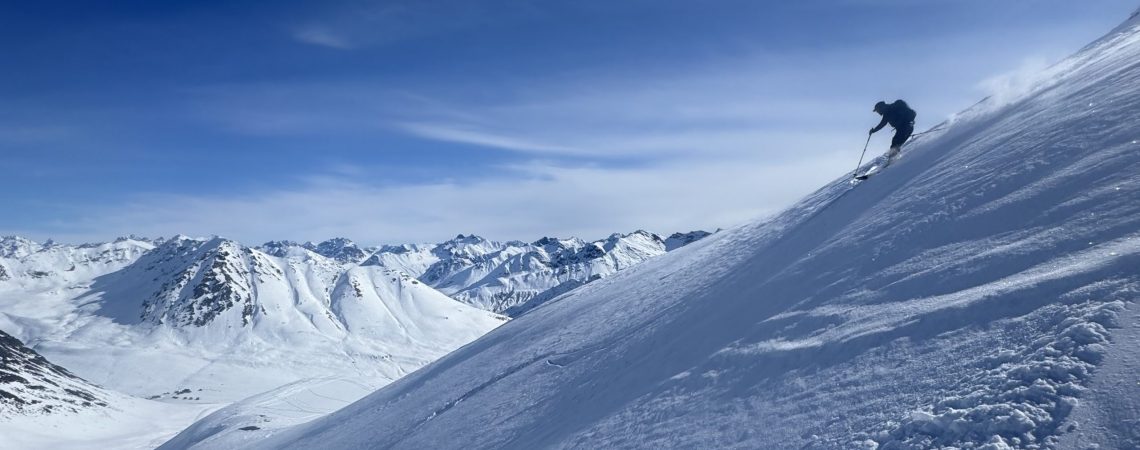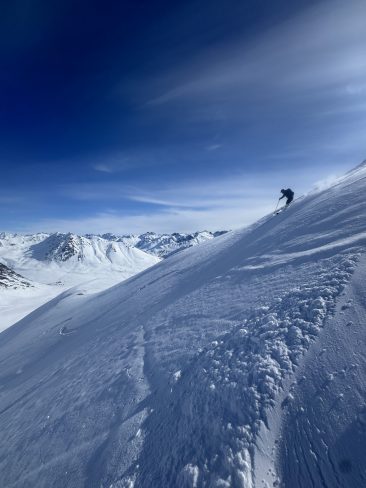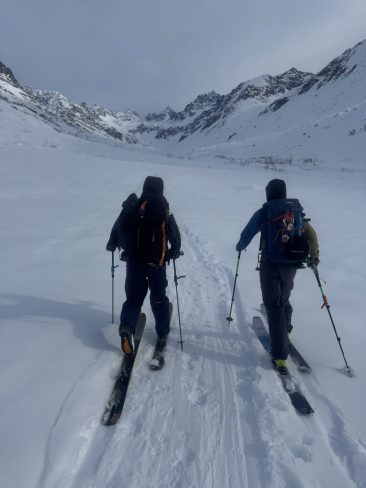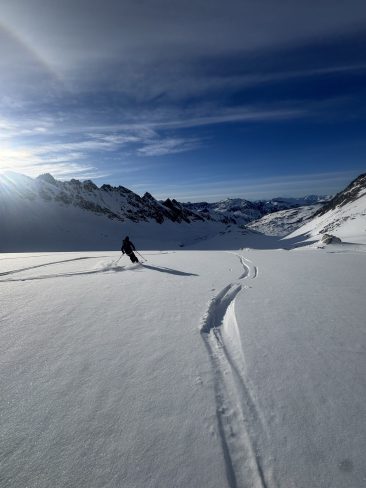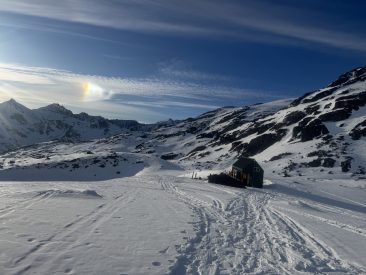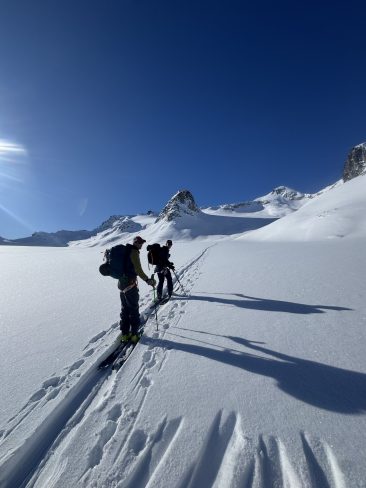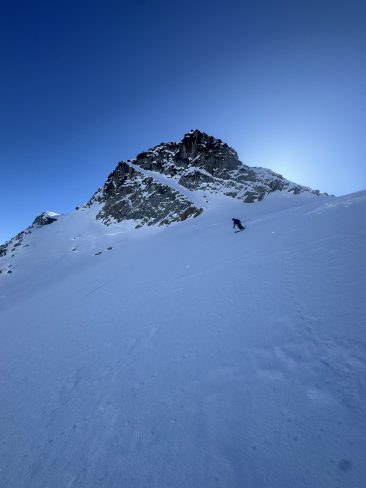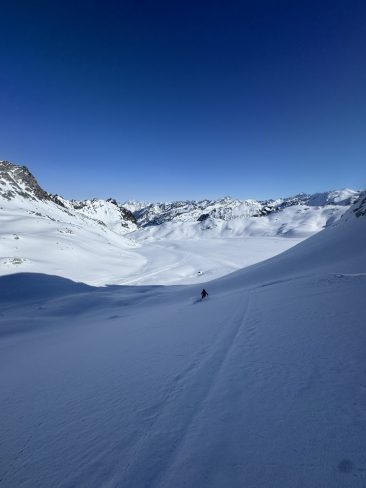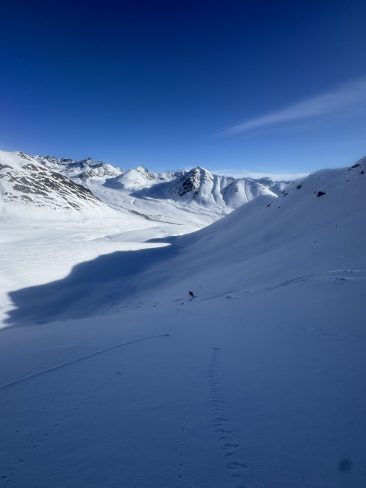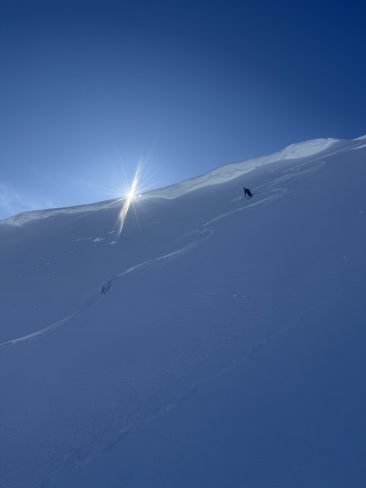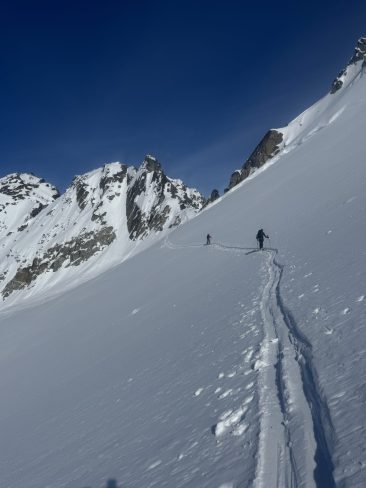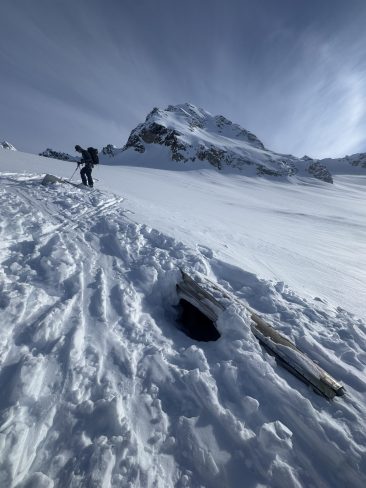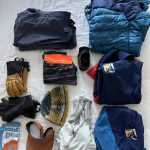2026 Dates: Custom
Duration: 3 days (with options for extra days at Hatcher Pass)
Level: Intermediate
Client Ratio: 4:1
Cost:
4:1 $350 per person per day
3:1 $450 per person per day
2:1 $550 per person per day
1:1 $800 per person per day
Cost: $500 Deposit/the balance due 60 days prior to the start of the program
- Transport in Alaska-Round Trip from Anchorage to Hatcher Pass
- Meals and Group Equipmernt
- Guided ski touring by certified AMGA/IFMGA guides
Not Included: Gratuities, transportation to Anchorage, personal equipment, meals & alcohol, Heli bumps
Offered as a three- or four-day trip, the Bomber Traverse strikes a perfect balance between challenging ski mountaineering and accessible adventure in one of Alaska’s most scenic and secluded ranges. Whether you opt for a faster-paced three-day push or a more relaxed four-day version with time for summit objectives or extra turns, this classic loop delivers stunning terrain, cozy hut stays, and unforgettable views around every corner.
Optional Hatcher Pass add-on days
Hatcher Pass offers a wealth of classic ski touring options and makes for an excellent add-on to the Bomber Traverse or a flexible buffer day to accommodate Alaska’s unpredictable weather. Just a short drive from Palmer, this easily accessible zone is stacked with quality terrain, including popular tours like Microdot, the Valley of Sin, Skyscraper Peak, Hatch Peak, and the Rae Wallace Chutes. The variety of aspects and terrain types—from mellow glades to steep alpine bowls—makes it possible to find great skiing in a wide range of conditions. Whether you’re waiting for a weather window to fly into the Talkeetnas or just want to squeeze in one more epic day, Hatcher Pass delivers big mountain feels with minimal logistics.
Day 1 – 2,500–3,000′ ↑, 6–7 miles, 5–7 hours
Meet in Palmer or Anchorage for a morning departure to the Gold Mint Trailhead. The tour begins with a scenic skin up the mellow Gold Mint Valley alongside the Little Susitna River. After several miles of gradual ascent, you’ll climb steeper slopes to gain the Bomber Glacier and reach the iconic Snowbird Hut (around 4,200 feet). This well-equipped hut provides a warm, comfortable basecamp nestled beneath towering granite peaks and alpine terrain that begs to be skied. If time and energy allow, an afternoon ski objective is available from the hut.
Day 2 – 3,000′ ↑, 3,000′ ↓, ~6–7 miles, 6–8 hours
Leave the Snowbird Hut and ascend over the col separating Snowbird and Bomber Glaciers. This section features fantastic ski terrain and dramatic views as you drop onto the Bomber Glacier. A short detour brings you to the remains of the B-29 bomber crash site, which gives the traverse its name. After enjoying turns on the glacier, continue to the beautiful Bomber Hut, perched in a high alpine cirque. The hut is a cozy and scenic place to spend the night, and many parties enjoy a sunset lap on nearby terrain after settling in.
Day 3 – 1,500′ ↑, 3,500′ ↓, ~7 miles, 4–6 hours
Depart the Bomber Hut and ascend a final pass above the Penny Royal Glacier, where one last panoramic view of the Talkeetnas unfolds. From here, enjoy a long descent down valley, rejoining mellow terrain before reconnecting with the Gold Mint Trail. Ski out the familiar approach and return to the trailhead with tired legs and huge smiles after completing one of Alaska’s best hut-to-hut ski traverses.
Optional Hatcher Pass days
Day 1 – 3,000–4,000′ ↑↓, ~6–8 miles, 5–7 hours
After a hearty breakfast in Anchorage or Palmer, we drive the short distance up to Hatcher Pass for our first ski tour. We’ll target a classic objective such as Microdot or Hatch Peak—both offer great fall-line skiing, excellent views, and a variety of descent options depending on conditions. Skinning up through glades or along mellow ridgelines, we’ll gain about 3,000 to 4,000 feet depending on group energy and weather. After enjoying high-quality powder or spring corn (conditions depending), we descend back to the car and head into town for a well-earned meal and rest.
Day 2 – 3,000–4,000′ ↑↓, ~6–8 miles, 5–7 hours
Today we’ll explore a different aspect of the pass—perhaps the Rae Wallace Chutes or Valley of Sin, two of Hatcher’s most celebrated ski lines. These zones offer a mix of steeper lines, playful terrain, and scenic approaches with plenty of options to tailor the day to snow stability and group interest. After another rewarding day in Alaska’s backcountry, we wrap up with a celebratory après and can either return to Anchorage or continue on to the next leg of your adventure.
Climbing/Ski Gear
- Adjustable Ski poles with powder (big) baskets*
- Skis or splitboard.Skis should be equipped with alpine touring bindings or telemark bindings. We prefer splitboards w/ skins because you do not need snow shoes.
- Alpine touring, telemark, or snowboard boots
- Skins with glop stopper (skin wax)
- Avalanche Beacon This needs to be Triple Antenna.
- Shovel Small collapsible style
- Avalanche Probe 265cm or longer
- Helmet for riding and climbing adjustable to fit over hats
- Ski Crampons Required for all ski mountaineering trips
- Alpine climbing harness Must have adjustable leg loops and fit over all clothing and can be put on with ski boots
- Ice axe Lightweight
- Crampons with anti-ball plate * Must be fit to boots prior to trip,
- 2 Locking carabiners Large, pear-shaped carabiner is best.
- 2 Regular carabiners lightweight
- 1 Single Length Runner/Sling
- Lightweight base layer T-shirt
- 1 long sleeve Sun Hoodie or shirt Lightweight, light colored for sunny days
- Soft Shell
- 1 Down/synthetic jacket with hood
- 1 Hard shell jacket with hood Waterproof and breathable. roomy enough to fit over multiple layers.
- 1 pair liner gloves Thin wool or polypropylene
- Shell gloves or mitts
- Warm hat Wool or synthetic
- Balaclava or Buff
- Shade hat or baseball cap
Lower Body
- 2 pair heavy wool/synthetic socks Check boot fit with liner and wool socks on
- 1 pair lightweight long underwear Polypropylene or Capilene
- Soft shell pants
- Shell pants Waterproof/breathable with full side zips, Gore-Tex or equivalent is best
Backpack
- Internal frame pack 2000-2500 cubic inch capacity able to carry snowboard/skis, Airbag packs can be refilled in Anchorage, one spot to do it via mail or instore is Dive Alaska (907) 770-1778, info@divealaska.net
Miscellaneous Equipment
- Goggles and Sunglasses 100% UV protection
- Personal first aid repair kit Basics: moleskin/blister kit, Band-Aids, first-aid tape, ibuprofen, personal medications, spare parts for bindings and batteries etc.
- Lip balm At least SPF 20
- Sunscreen At least SPF 40
- Headlamp lightweight LED
- 2 water bottles 1 liter wide-mouth Nalgene and 1 bottle holster, or
- Hydration bladder With drinking tube and 1 Nalgene bottle
- Bowl and spoon Plastic, small Tupperware works well. Lexan spoons are best.
- Toiletry kit Be sure to include WAG Bag or toilet paper stored in a plastic bag.
- Bandana
- Hand wipes
- 1 small stainless steel thermos (Optional)
- Favorite snack foods (no more than 2 pounds)
WHO WILL MY GUIDE (OR GUIDES) BE?
You will receive an introductory email with the guide for your course. We are small company who enjoy working together in the mountains as well as highly skilled professionals who hold current Wilderness First Responder certification and are proficient in technical rescue and evacuation skills. Our guides are dedicated to the world of alpinism, many having first ascents and hold professional certifications with AIARE & AMGA. The AMGA is part of the IFMGA, which is the international body of certified mountain guides.
HOW MUCH SHOULD I TIP MY GUIDES?
Tipping is considered standard practice in the guiding industry. Tipping amounts vary – so $15-20 per day per person/per guide is average that works well for the guides without a serious blow to your wallet. Often 10% of the course cost is a good rule-of-thumb. If you feel that the program was exceptional or substandard the tip can reflect that.
CAN I RENT EQUIPMENT FROM BCAG?
No, trips like this we recommend owning your equipment due to the length of the trip.
HOW HEAVY WILL MY PACK BE?
You will carry 10-15 pounds, which will include everything on the equipment list.
WHEN DO I NEED TO PAY THE BALANCE OF MY TRIP?
Payable when you make your reservation by check, or credit card.
WHAT HAPPENS IF I NEED TO CANCEL MY TRIP?
If you should decide to cancel your trip, BCAG must be notified in writing. Your trip will be cancelled from the date we receive written notice. You will be assessed a cancellation fee according to the following schedule:
90 to 22 days from trip departure – 50% of trip cost
30 days or less – 100% of trip cost
WHAT HAPPENS IF I WANT TO CHANGE THE DATES OF MY TRIP?
Schedule changes are subject to a $50 fee per person up to 2 weeks out and $100 less then 14 days from the start of the trip and may not be possible. If conditions or circumstances preclude running a scheduled program we reserve the right to make the decision as to whether the program will be canceled, rescheduled, or an alternative provided.
WHAT HAPPENS IF BC ADVENTURE GUIDES HAS TO CANCEL MY TRIP?
In the rare circumstance where we need to cancel a program you can reschedule without a fee or receive a refund on your deposit. If circumstances arise that force us to cancel a program that is already in progress we reserve the right to decide whether a refund or credit, at a prorated rate, will be issued. We are not responsible for cancellation fees or costs arising from your changed or cancelled flights, lodging, or other arrangements. We strongly recommend obtaining trip cancellation insurance from your travel agent.
DO I NEED TO PURCHASE TRIP INSURANCE?
BCAG highly encourages the purchasing of trip cancellation and travel insurance on domestic trips and requires it on International trips. Europeans and Canadians use it because travel insurance provides coverage for trip cancellation and interruption, travel delays, loss of baggage and travel documents, baggage delays, medical expenses and emergency assistance.
Several options include Travelex or Travel Guard International at (1-877-248-8992) & www.travelguard.com for protecting your investment, however there are many companies to choose from and you may wish to do some individual research regarding which policy is right for you.
WHEN SHOULD I PLAN TO LEAVE A RETURN HOME?
We often get this question because most people need to know how much total time they need to take off work. We fly to Anchorage on the 30th and plan to fly home on the 6th.


